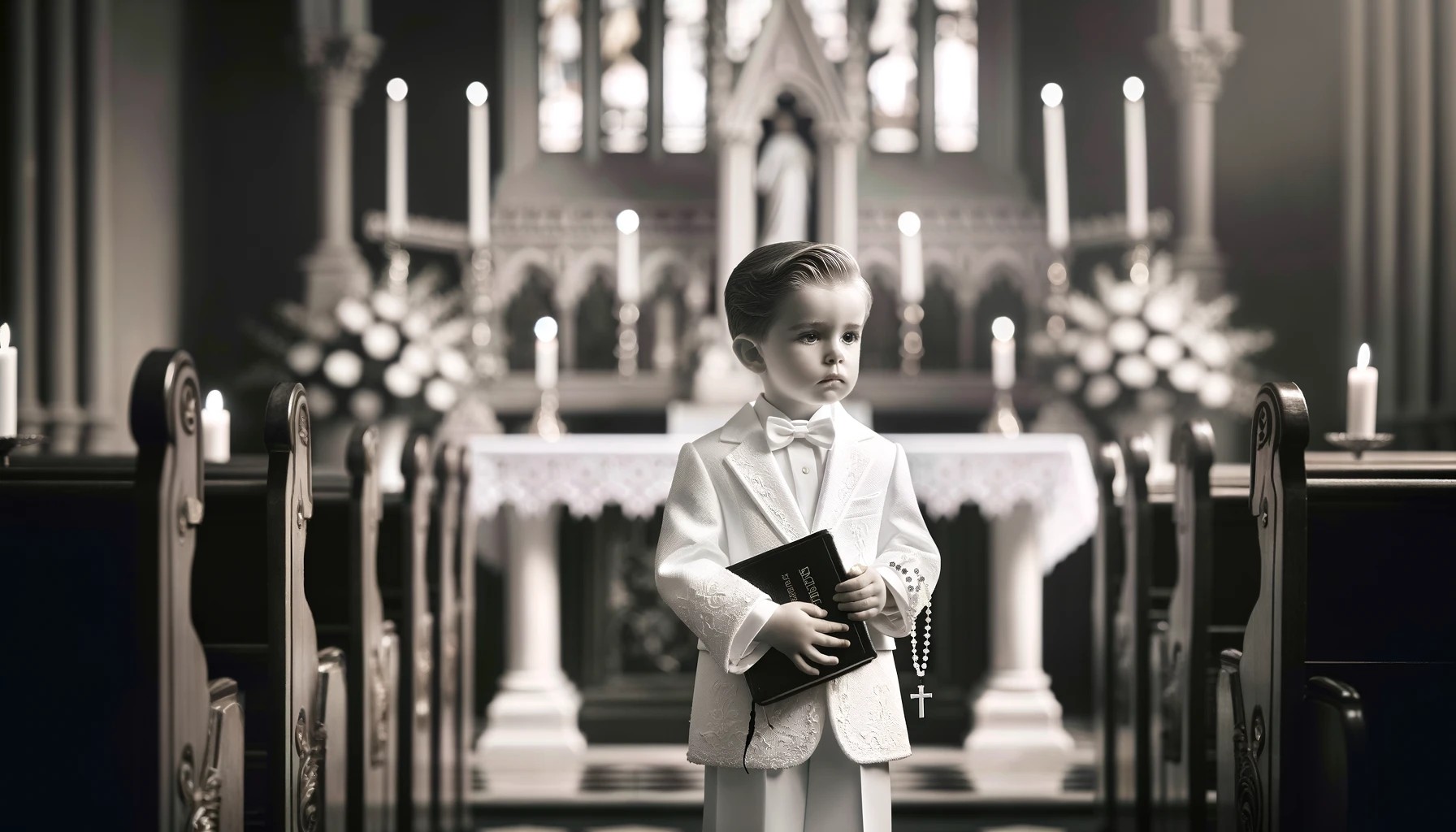Home>Theology and Spirituality>When Do You Make Your First Communion


Theology and Spirituality
When Do You Make Your First Communion
Published: February 25, 2024
Ericka Andersen, an editor at Christian.net, expertly merges digital strategy with content creation, focusing on faith and societal issues. Her communication skills enhance the platform's engaging narratives, fostering meaningful dialogue on belief's impact on society.
Discover the significance and traditions of making your first communion in the context of theology and spirituality. Explore the spiritual journey and preparation for this important sacrament.
(Many of the links in this article redirect to a specific reviewed product. Your purchase of these products through affiliate links helps to generate commission for Christian.net, at no extra cost. Learn more)
Table of Contents
Introduction
First Communion is a significant milestone in the lives of many young Christians, marking the moment when they partake in the Eucharist for the first time. This sacred event holds deep spiritual and cultural significance, symbolizing a child's initiation into the central sacrament of the Christian faith. The journey towards First Communion is a time of learning, reflection, and spiritual growth, as children prepare to receive the body and blood of Christ in the form of bread and wine.
The anticipation and preparation for First Communion often create a sense of excitement and reverence within families and communities. It is a time when young individuals begin to grasp the profound meaning of the Eucharist and its role in their spiritual lives. The experience of receiving the sacrament for the first time is a cherished memory for many, etching a profound spiritual impression that resonates throughout their lives.
As we delve into the significance, age considerations, and preparation for First Communion, it becomes evident that this sacred rite of passage holds a special place in the hearts of believers across different Christian denominations. It is a time of joy, reflection, and spiritual awakening, as young Christians take a significant step in their faith journey.
Read more: When Is First Communion Held
The Significance of First Communion
First Communion holds profound significance within the Christian faith, symbolizing a pivotal moment in a child's spiritual journey. This sacred rite marks the first time a young individual partakes in the Eucharist, receiving the body and blood of Christ in the form of bread and wine. The act of receiving the Eucharist is deeply rooted in the teachings of Jesus Christ, as he shared bread and wine with his disciples during the Last Supper, instructing them to continue this practice in remembrance of him.
The significance of First Communion extends beyond the act of consuming the consecrated elements. It represents a profound spiritual union with Christ and the community of believers. Through this sacrament, participants are believed to receive the grace of God, strengthening their bond with the divine and affirming their place within the body of Christ. It is a moment of profound spiritual nourishment, as participants are united with Christ in a deeply personal and transformative way.
Furthermore, First Communion serves as a visible expression of a child's growing understanding of the Christian faith. It signifies their readiness to participate more fully in the life of the church and to embrace their role as members of the Christian community. The event is often celebrated with great joy and reverence, as families and congregations come together to witness and support the children as they take this significant step in their faith journey.
The memories of First Communion often endure as a cherished part of a person's spiritual narrative, shaping their understanding of the Eucharist and leaving a lasting impression on their relationship with God. The experience fosters a sense of belonging and spiritual connectedness, laying a foundation for continued growth in faith and understanding of the Christian tradition.
In essence, First Communion is a sacred and transformative moment, signifying a child's initiation into the central sacrament of the Christian faith and fostering a deeper connection with Christ and the Christian community. It is a time of joy, reflection, and spiritual significance, marking the beginning of a lifelong journey of faith and devotion.
Age of First Communion in Different Christian Denominations
The age at which children receive their First Communion varies among different Christian denominations, reflecting diverse theological perspectives, cultural traditions, and pastoral considerations. While there is no universal standard, the age of First Communion is often influenced by the teachings and practices of specific Christian traditions. Here is an overview of the age of First Communion in several major Christian denominations:
Roman Catholic Church
In the Roman Catholic Church, First Communion is typically received around the age of seven, which is considered the "age of reason" when children are deemed capable of understanding the significance of the Eucharist. This age is seen as a developmental milestone when children can comprehend the spiritual meaning of receiving the body and blood of Christ. The preparation for First Communion often involves catechism classes and a period of spiritual formation to ensure that children are adequately prepared to receive the sacrament.
Eastern Orthodox Church
In the Eastern Orthodox tradition, the age of First Communion varies among different ethnic and cultural contexts. Generally, children receive their First Communion at a later age, often around ten to fourteen years old. This practice is influenced by the emphasis on spiritual maturity and a deeper understanding of the Eucharist before partaking in the sacrament. The preparation for First Communion in the Eastern Orthodox Church involves a comprehensive education in the teachings and traditions of the faith, ensuring that children are fully prepared to receive the Eucharist.
Read more: What Do Godparents Do At First Communion
Anglican Communion
Within the Anglican Communion, the age of First Communion varies across different provinces and parishes. In some Anglican churches, children receive their First Communion around the age of seven, similar to the Roman Catholic tradition. However, in other Anglican communities, the age of First Communion may be older, aligning with the emphasis on spiritual readiness and understanding of the Eucharist before participation.
Lutheran Church
In the Lutheran tradition, the age of First Communion varies among different synods and congregations. While there is no fixed age, children typically receive their First Communion after undergoing a period of catechetical instruction and spiritual preparation. This may occur around the ages of seven to ten, depending on the local customs and pastoral guidance within Lutheran communities.
Other Christian Denominations
In various Protestant denominations, the age of First Communion varies widely, reflecting the diversity of theological perspectives and cultural practices. Some Protestant churches practice open communion, allowing individuals of all ages to participate in the Eucharist, while others may have specific age-related guidelines for First Communion based on their theological convictions and pastoral considerations.
In summary, the age of First Communion varies across different Christian denominations, reflecting a range of theological, cultural, and pastoral factors. While the specific age may differ, the underlying significance of this sacred rite remains a central aspect of the Christian faith, marking a profound moment of spiritual initiation and communion with Christ.
Factors Affecting the Timing of First Communion
The timing of First Communion is influenced by a myriad of factors that encompass theological, cultural, and pastoral considerations within Christian communities. These factors play a pivotal role in determining when children are deemed ready to partake in the Eucharist for the first time, shaping the age at which First Communion is celebrated.
Theological Perspectives
The theological beliefs and teachings of specific Christian denominations significantly impact the timing of First Communion. Different traditions hold varying views on the spiritual readiness and understanding required for participation in the Eucharist. For example, in the Roman Catholic Church, the concept of the "age of reason" serves as a theological basis for determining the readiness of children to receive First Communion, while in the Eastern Orthodox tradition, an emphasis on spiritual maturity and comprehension of the Eucharist influences the timing of this sacramental milestone.
Developmental Readiness
The cognitive and emotional development of children is a crucial factor in determining the timing of First Communion. Many Christian communities consider the age at which children can grasp the significance of the Eucharist and participate in the ritual with a degree of understanding and reverence. This developmental readiness varies among individuals and is often assessed through the guidance of parents, clergy, and religious educators.
Cultural Traditions
Cultural customs and traditions within Christian communities also influence the timing of First Communion. Certain ethnic and regional practices may dictate specific ages or ceremonial customs associated with this sacramental event. These cultural influences shape the way in which First Communion is celebrated and the age at which children are prepared to partake in the Eucharist within their respective cultural contexts.
Pastoral Discernment
Pastoral guidance and discernment play a vital role in determining the timing of First Communion within local congregations. Clergy and religious leaders often assess the spiritual readiness of children through pastoral care, catechetical instruction, and individual discernment. This personalized approach allows for the consideration of unique circumstances and the spiritual development of each child within the faith community.
Read more: What Do You Do In Your First Communion
Family Involvement
The involvement of families in the preparation for First Communion can impact the timing of this sacred milestone. Family dynamics, religious practices at home, and the level of parental engagement in nurturing the faith of their children contribute to the overall readiness for First Communion. The support and involvement of families in the spiritual formation of their children are integral to the timing and significance of this sacramental event.
In essence, the timing of First Communion is shaped by a complex interplay of theological, developmental, cultural, pastoral, and familial factors. These considerations reflect the diverse and dynamic nature of Christian traditions, emphasizing the significance of this sacred rite within the lives of young believers.
Preparation for First Communion
Preparation for First Communion is a multifaceted and spiritually enriching process that encompasses education, spiritual formation, and the nurturing of a deep understanding of the Eucharist. This period of preparation is integral to ensuring that children are spiritually and emotionally ready to receive the sacrament of the Eucharist for the first time. The journey towards First Communion involves a range of meaningful activities and experiences that contribute to the holistic preparation of young individuals for this sacred milestone.
Catechetical Instruction
Central to the preparation for First Communion is catechetical instruction, which provides children with a comprehensive understanding of the Eucharist, its significance, and the rituals associated with receiving the body and blood of Christ. Catechism classes, often conducted by clergy, religious educators, or catechists, offer a structured curriculum that covers the theological, historical, and spiritual dimensions of the Eucharist. Through engaging lessons, discussions, and activities, children learn about the Last Supper, the meaning of transubstantiation, and the importance of the Eucharist in the life of the church.
Spiritual Formation
In addition to intellectual instruction, spiritual formation plays a vital role in preparing children for First Communion. This aspect of preparation focuses on nurturing the spiritual growth and faith development of young individuals. Through prayer, reflection, and participation in age-appropriate spiritual practices, children deepen their connection to God and develop a personal relationship with Jesus Christ. Spiritual formation activities may include attending Mass, engaging in prayerful reflection, and learning about the lives of saints and biblical figures who exemplify faith and devotion.
Read more: When Do You Do Communion At A Wedding
Sacramental Reconciliation
The preparation for First Communion often includes the sacrament of reconciliation, also known as confession. This sacramental rite allows children to seek forgiveness for their sins and reconcile with God and the community. Through the sacrament of reconciliation, children experience the grace of God's mercy and are encouraged to approach the Eucharist with a pure heart and a renewed spirit. The sacrament of reconciliation serves as a pivotal component of spiritual preparation, fostering a sense of repentance, forgiveness, and spiritual renewal in anticipation of receiving the Eucharist.
Read more: What Do You Do In Your First Communion
Family Involvement
Families play a crucial role in the preparation for First Communion, serving as primary sources of spiritual guidance and support for children. Parents and guardians are encouraged to actively engage in their children's preparation, fostering a nurturing environment that reinforces the teachings and values associated with the Eucharist. Family involvement may include participating in family-centered religious activities, discussing the significance of the Eucharist at home, and cultivating a prayerful atmosphere that enriches the spiritual journey of children as they prepare for First Communion.
Celebration and Rite of Passage
The culmination of the preparation for First Communion is marked by a celebratory and reverent ceremony in which children receive the Eucharist for the first time. This sacred rite of passage is often accompanied by a special Mass, where children, dressed in traditional attire, partake in the Eucharist amidst the loving support of their families and the faith community. The celebration of First Communion is a joyous and solemn occasion, signifying the spiritual readiness and commitment of children to embrace the Eucharist as a central aspect of their faith journey.
In essence, the preparation for First Communion encompasses a holistic approach to spiritual and intellectual formation, emphasizing the significance of the Eucharist in the lives of young believers. Through catechetical instruction, spiritual formation, sacramental reconciliation, family involvement, and the celebratory rite of passage, children are equipped with the knowledge, faith, and reverence necessary to receive the Eucharist with understanding and devotion. This period of preparation fosters a deep and lasting appreciation for the Eucharist, laying a foundation for continued spiritual growth and participation in the life of the church.
Conclusion
In conclusion, the journey towards First Communion represents a significant and transformative period in the lives of young Christians. This sacred rite of passage holds deep spiritual and cultural significance, symbolizing a child's initiation into the central sacrament of the Christian faith. The significance of First Communion extends beyond the act of consuming the consecrated elements; it represents a profound spiritual union with Christ and the community of believers.
The age at which children receive their First Communion varies among different Christian denominations, reflecting diverse theological perspectives, cultural traditions, and pastoral considerations. The timing of First Communion is influenced by theological perspectives, developmental readiness, cultural traditions, pastoral discernment, and family involvement, highlighting the complex interplay of factors that shape this sacred milestone.
Preparation for First Communion involves catechetical instruction, spiritual formation, sacramental reconciliation, family involvement, and the celebratory rite of passage. This comprehensive preparation equips children with the knowledge, faith, and reverence necessary to receive the Eucharist with understanding and devotion, fostering a deep and lasting appreciation for the Eucharist and laying a foundation for continued spiritual growth.
The memories of First Communion often endure as a cherished part of a person's spiritual narrative, shaping their understanding of the Eucharist and leaving a lasting impression on their relationship with God. The experience fosters a sense of belonging and spiritual connectedness, laying a foundation for continued growth in faith and understanding of the Christian tradition.
In essence, First Communion is a sacred and transformative moment, signifying a child's initiation into the central sacrament of the Christian faith and fostering a deeper connection with Christ and the Christian community. It is a time of joy, reflection, and spiritual significance, marking the beginning of a lifelong journey of faith and devotion.











